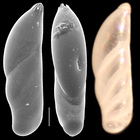WoRMS taxon details
Vaginulinopsis sublegumen Parr, 1950
417861 (urn:lsid:marinespecies.org:taxname:417861)
accepted
Species
Astacolus sublegumen (Parr, 1950) · unaccepted > misapplication (Misidentification Opinion of...)
Misidentification Opinion of Stulpinaite et al. (2020)
marine, brackish, fresh, terrestrial
recent + fossil
Parr, W. J. (1950). Foraminifera. <em>B.A.N.Z. Antarctic Research Expedition 1929-1931. Report.</em> Series B 5 (6): 232-392.
page(s): p. 325, pl. 11, fig. 18 [details] Available for editors [request]
[request]
page(s): p. 325, pl. 11, fig. 18 [details] Available for editors
Type locality contained in Antarctic Ocean
type locality contained in Antarctic Ocean [details]
Distribution Stulpinaite et al. (2020, p. 745): "Astacolus sublegumen was reported to be present in Turkey by Meriç et al. (2004). The...
Distribution Stulpinaite et al. (2020, p. 745): "Astacolus sublegumen was reported to be present in Turkey by Meriç et al. (2004). The holotype of this species originates from the Antarctic Ocean and is currently referred to as Vaginulinopsis sublegumen (see Jones, 1994; and WoRMS Editorial Board, 2020). The specimen illustrated by Meriç et al. (2004) significantly differs from the holotype. The same illustration was used in Yokeş & Meriç (2009) and Meriç et al. (2014). To date, there is no valid record of Vaginulinopsis sublegumen in the Mediterranean Sea and the species is therefore absent and not alien." [details]
Hayward, B.W.; Le Coze, F.; Vachard, D.; Gross, O. (2025). World Foraminifera Database. Vaginulinopsis sublegumen Parr, 1950. Accessed through: World Register of Marine Species at: https://www.marinespecies.org/aphia.php?p=taxdetails&id=417861 on 2025-05-01
![]() The webpage text is licensed under a Creative Commons
Attribution 4.0 License
The webpage text is licensed under a Creative Commons
Attribution 4.0 License
Nomenclature
original description
Parr, W. J. (1950). Foraminifera. <em>B.A.N.Z. Antarctic Research Expedition 1929-1931. Report.</em> Series B 5 (6): 232-392.
page(s): p. 325, pl. 11, fig. 18 [details] Available for editors [request]
[request]
basis of record Sen Gupta, B. K.; Smith, L. E.; Machain-Castillo, M. L. (2009). Foraminifera of the Gulf of Mexico in Felder, D.L. and D.K. Camp (eds.), Gulf of Mexico–Origins, Waters, and Biota. <em>Biodiversity. Texas A&M Press, College Station, Texas.</em> 87-129. [details] Available for editors [request]
[request]
page(s): p. 325, pl. 11, fig. 18 [details] Available for editors
basis of record Sen Gupta, B. K.; Smith, L. E.; Machain-Castillo, M. L. (2009). Foraminifera of the Gulf of Mexico in Felder, D.L. and D.K. Camp (eds.), Gulf of Mexico–Origins, Waters, and Biota. <em>Biodiversity. Texas A&M Press, College Station, Texas.</em> 87-129. [details] Available for editors
Other
context source (Introduced species)
Katsanevakis, S.; Bogucarskis, K.; Gatto, F.; Vandekerkhove, J.; Deriu, I.; Cardoso A.S. (2012). Building the European Alien Species Information Network (EASIN): a novel approach for the exploration of distributed alien species data. <em>BioInvasions Records.</em> 1: 235-245., available online at http://easin.jrc.ec.europa.eu [details] Available for editors  [request]
[request]
context source (Deepsea) Intergovernmental Oceanographic Commission (IOC) of UNESCO. The Ocean Biogeographic Information System (OBIS), available online at http://www.iobis.org/ [details]
context source (Deepsea) Intergovernmental Oceanographic Commission (IOC) of UNESCO. The Ocean Biogeographic Information System (OBIS), available online at http://www.iobis.org/ [details]
 Present
Present  Present in aphia/obis/gbif/idigbio
Present in aphia/obis/gbif/idigbio  Inaccurate
Inaccurate  Introduced: alien
Introduced: alien  Containing type locality
Containing type locality
From editor or global species database
Distribution Stulpinaite et al. (2020, p. 745): "Astacolus sublegumen was reported to be present in Turkey by Meriç et al. (2004). The holotype of this species originates from the Antarctic Ocean and is currently referred to as Vaginulinopsis sublegumen (see Jones, 1994; and WoRMS Editorial Board, 2020). The specimen illustrated by Meriç et al. (2004) significantly differs from the holotype. The same illustration was used in Yokeş & Meriç (2009) and Meriç et al. (2014). To date, there is no valid record of Vaginulinopsis sublegumen in the Mediterranean Sea and the species is therefore absent and not alien." [details]From regional or thematic species database
Introduced species vector dispersal in Turkish part of the Aegean Sea (Marine Region) : Canals: natural range expansion through man-made canals [details]


